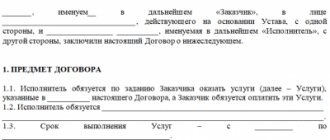Last modified: February 2021
The “beginning of all beginnings” of business legal relations arising between the employer and the employed citizen is an employment contract, a sample of which is provided for by labor legislation in order to specify the “mission” being performed. The document regulates the relationship between the parties, details the rights and obligations, helping, when controversial issues arise, to make a compromise decision on a mutually beneficial basis without involving the “servants of the Labor Themis”.
List of documents for drawing up an employment contract
An employment contract must be signed; it is not enough to get by with an order and an entry in the work book. If such a situation arises, then this is a direct violation of labor laws. However, an employment contract is considered concluded if the employee began work with the permission of the employer or his authorized representative. To hire an employee, you need to ask him for a package of documents:
- passport;
- work book;
- TIN;
- SNILS;
- educational documents;
- military registration document, if the citizen is liable for military service;
- medical certificate (if necessary).
A medical certificate is required if a minor is hired. In addition, the certificate must be provided to drivers, security guards, cooks, doctors, etc.
What an employment contract cannot contain
Article 9 of the Labor Code of the Russian Federation states that an employment contract should not include conditions that will reduce the level of rights and guarantees of workers fixed in labor legislation. In the event that such conditions are included in the contract, they may not be applicable.
Even the voluntary consent of a worker to conditions that worsen his situation cannot relieve the employer from liability, which is established in case of violation of the law on labor relations.
For example, conditions that may worsen the employee's position include conditions for wages paid in kind in full, or a condition that provides for full compensation for damage in cases where the law provides for limited financial liability.
Thus, an employment contract presupposes the individualization of working conditions and increased guarantees for each worker.
Author of the article
Contents of the employment contract
Information specified in the contract:
- surname, name, patronymic of the employee and the name of the employer (surname, name, patronymic of the employer - an individual) who entered into an employment contract;
- information about documents proving the identity of the employee and the employer - an individual;
- taxpayer identification number (for employers, with the exception of employers - individuals who are not individual entrepreneurs);
- information about the employer’s representative who signed the employment contract and the basis on which he is vested with the appropriate powers;
- place and date of conclusion of the employment contract.
Features of the presentation of details
The details of employment contracts are important. With its help, the legality of concluding such an agreement, identification of its parties, and the ability to find the original document of the employer (if only a copy is present) are established. Among the main requirements for details, it is worth highlighting the following:
- full name of the company, position, full name of the document signatory;
- designation of the document type;
- date of drawing up the contract;
- registration number (assigned by the administration);
- place (city) of compilation;
- the presence of norms and sections provided for by the Labor Code of the Russian Federation and other laws;
- signatures of the parties;
- presence of an imprint of the employer's seal;
- a note confirming the delivery of the second copy to the worker.
Remember, the absence of certain details may lead to the recognition of the contract as invalid in whole or in some part.
Mandatory terms of the employment contract
The following conditions must be included in the employment contract:
- place of work. If an employee is hired to work in a branch, representative office or other separate structural unit of the organization, which is located in another location, the place of work indicating the separate structural unit and its location;
- labor function. Those. work according to the position in accordance with the staffing table, profession, specialty indicating qualifications; the specific type of work assigned to the employee;
- work start date. If a fixed-term employment contract is concluded, then you need to indicate the duration of its validity and the circumstances that served as the basis for concluding a fixed-term employment contract;
- terms of remuneration. It is necessary to indicate the size of the employee’s tariff rate or salary, various additional payments, allowances and incentive payments;
- working hours and rest hours are indicated for workers whose conditions differ from the general rules;
- guarantees and compensation for work under harmful and (or) dangerous working conditions;
- conditions that determine, in necessary cases, the nature of the work (mobile, traveling, on the road, other nature of work);
- working conditions in the workplace;
- condition on compulsory social insurance of the employee;
- other conditions in cases provided for by labor legislation and other regulatory legal acts containing labor law norms.
The employment contract can be supplemented with information that is not presented here. Please note that the information must be included in the text of the employment contract, the terms and conditions must be included in the annex to the employment contract.
Responsibility of the parties
After an employment contract has been concluded between an organization and a citizen, the parties must take into account the rights and obligations of each other. If facts of violation of rights or improper performance of duties are revealed, both the employee and the employer may be held liable for violating the legislation of the Russian Federation.
Responsibility for this type of violation is provided for both disciplinary (for an employee) and administrative and criminal (for a legal entity).
Responsibilities and basic rights of an employee
Based on the provisions set out in Art. 21 of the Labor Code of the Russian Federation, an employee has the right to count on:
- Conclude, terminate and amend an employment agreement in accordance with the laws of the country.
- Get the job described in the employment contract.
- To obtain a workplace that meets labor safety and health standards.
- To receive remuneration in a timely manner and in the amount specified in the agreement.
- To provide rest paid by the employer, including vacations, weekends and holidays.
- To receive complete and truthful information about working conditions.
- An employee can join , unite and create trade unions to effectively protect their rights, freedoms and interests.
- Manage the company within the framework specified by the collective agreement.
- Protect your rights by all available means provided for by the legislation of the Russian Federation.
- Receive compensation for moral and physical harm caused in the process of performing direct labor functions.
- If the Federal Law provides for compulsory insurance , you can obtain it.
Responsibilities of the employee:
- A company employee is obliged to conscientiously and fully perform his functions prescribed in the concluded employment contract.
- Fully comply with the routine and discipline at the enterprise.
- Ensure the safety of the employer's property.
- Immediately notify the employer of dangerous situations that pose a threat to the life and health of the company’s employees and the safety of the employer’s property.
Responsibilities and basic rights of the employer
The employer has the right:
- Conclude, amend and terminate employment contracts.
- The employer can participate in collective bargaining , conduct them and conclude collective agreements.
- Take measures to encourage conscientious and efficient employees.
- Require the safety of the enterprise’s property and apply sanctions in case of non-compliance with this right.
- Require employees to follow the internal rules of the organization.
- Creating and joining communities in order to protect their legal rights.
Responsibilities of the employer:
- Ensure compliance with the standards established in the Labor Code of the Russian Federation and other legislative acts.
- Provide the work described in the employment agreement.
- It is prohibited to require employees to perform work that is not included in the contract.
- The employer must provide the employee with safety and working conditions that meet the standards.
- Fully provide employees with materials , equipment and tools necessary to perform their job duties.
- Comply with the principle of equal pay for work of equal value.
- Pay contractual remuneration to employees.
- Provide employees with complete and reliable information regarding their job responsibilities.
- Timely inform employees of changes in regulations that directly affect their work.
- Provide employees with household needs that arise during the performance of job duties.
- In accordance with the procedure established by the Federal Law, provide compulsory social insurance for employees.
- Compensate for harm received as a result of their performance of work duties.
Duration of the employment contract
An employment contract is concluded for a specific period or for an indefinite period (no more than 5 years). A contract that specifies a period of validity is called a fixed-term contract. It can only be concluded in the following cases:
- for the duration of the duties of an employee who is currently absent;
- for non-permanent work for up to 2 months; time to perform temporary (up to two months) work;
- to perform seasonal work;
- with citizens who are sent abroad;
- for carrying out work that goes beyond the normal activities of the employer (reconstruction, installation, commissioning and other work), as well as work related to a deliberately temporary (up to one year) expansion of production or the volume of services provided;
- with persons entering work in organizations created for a predetermined period or to perform a predetermined job;
- with citizens who are accepted to perform certain work in cases where its completion cannot be determined by a specific date;
- practice, vocational training, internship;
- for an elected position or as part of an elected body and in some other cases;
- with citizens who are sent to perform alternative civil service;
- in other cases.
A fixed-term employment contract can be concluded by mutual agreement of the two parties:
- with an individual entrepreneur who has no more than 35 employees on staff (in the field of retail trade and consumer services - 20 people);
- with pensioners by age;
- with citizens who, for health reasons in accordance with a medical report, are allowed to work exclusively of a temporary nature;
- with citizens applying for work in organizations located in the Far North and equivalent areas, if this involves moving to their place of work;
- with creative workers of the media, cinematography organizations, theaters, theater and concert organizations, circuses, etc.;
- with crew members of sea vessels, inland navigation vessels and mixed navigation vessels registered in the Russian International Register of Ships and more.
In other cases, the employer enters into an employment contract with the employee for an indefinite period. When the term of a fixed-term contract expires and the employee is not going to be fired, an additional agreement is signed to conclude a contract for an indefinite period.
Types of employment contracts
There are several types of employment contracts, the features of which are similar to each other:
- duration of the contract (fixed-term and unlimited);
- according to labor conditions (shift work, dangerous, harmful, rotational work, etc.);
- by type of employer (legal entity or individual entrepreneur, etc.);
- by type of labor relations, main place, part-time job, public service, etc.);
- according to the legal status of the employee (minors, foreigners, etc.);
- by length of working time (full time, irregular working hours, etc.);
- due to the emergence of labor relations (election to a position, competition, etc.);
- by employee categories (teachers, athletes, coaches, etc.).
Basic requirements for an employment contract
The law determined the basic requirements for employment contracts. They can be sorted into several blocks:
- The contract must be exclusively written. It is clear that in order to prove the volume of work, as well as the conditions for its implementation and payment, you need to have a document signed by both parties. On the other hand, this is a basic requirement of regulatory authorities. After all, only on paper can one obtain clear evidence that the norm of the law was implemented in full.
- Prerequisites must be present. At the legislative level, a list of conditions is defined without which the conclusion of an agreement is impossible. All of them must be included in such a bilateral agreement. If additional obligations or terms of cooperation are required for a specific position based on other regulations, this can be added. The main thing is that the basic conditions are not removed.
- Obligations cannot be transferred to third parties. All conditions set out in the employment agreement must be fulfilled personally by the parties. It is not allowed to entrust them to someone else or to use contractors. This norm is laid down at the level of law. This must be taken into account when signing such a document.
- Unilateral change of conditions (except for termination of the agreement) is not allowed. Termination of the contract at the initiative of the administration is accompanied by compliance with a clear procedure (recording violations, notifying the employee, offering other positions, allowing time for reflection, searching for another job).
- Such agreements always have a financial side in the form of wages for the employee. Its size cannot be lower than the established state minimum. Violation of this rule entails legal liability for the employer.
Remember, an employment contract is a specific document, the contents of which are determined by law. Deviation from these norms is possible only in terms of clarification and expansion (within reasonable and normatively justified limits) of existing norms.








